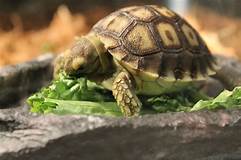What Do Pet Tortoises Eat?
Tortoises are fascinating creatures that make great pets. They are generally low-maintenance and can live for a long time. However, it is important to know what to feed your tortoise to ensure it stays healthy and happy. In this article, we will delve into the dietary needs of pet tortoises and provide a detailed guide to the types of foods they should eat.

Diet of Pet Tortoises
In general, tortoises are herbivores, meaning their diet primarily consists of plants. However, some species of tortoises may also eat small insects, snails, and worms as a source of protein. Providing a balanced diet that meets the specific nutritional requirements of your tortoise is crucial for its well-being. Here are some of the main components of a tortoise's diet:
Vegetables
Fresh vegetables form a significant part of a tortoise's diet. Some of the most commonly offered vegetables include:
- Leafy greens: Kale, collard greens, dandelion greens, and romaine lettuce are all excellent sources of fiber, vitamins, and minerals.
- Cruciferous vegetables: Broccoli, cauliflower, and Brussels sprouts are rich in antioxidants and vitamins.
- Other vegetables: Shredded carrots, green beans, and bell peppers can also be included in your tortoise's diet.
Fruits
Fruits can be offered to tortoises as occasional treats, but they should not be a staple part of their diet. Some of the fruits that tortoises can eat include:
- Berries: Raspberries, blueberries, and strawberries are good sources of vitamins and antioxidants.
- Apples: Apples provide fiber and vitamins, but the seeds should be removed.
- Bananas: Bananas are high in potassium and can be offered in moderation.
Protein
While tortoises are primarily herbivores, they may also eat small amounts of protein in their diet. Some sources of protein include:
- Insects: Mealworms, crickets, and earthworms can be offered as a treat for tortoises.
- Snails: Some tortoises enjoy eating snails, which can provide calcium and protein.
- Commercial tortoise food: Some commercial tortoise foods may contain animal-based proteins, but these should be used sparingly.
Calcium
Calcium is an essential mineral for tortoises, and it is crucial for maintaining healthy bones and shells. Some good sources of calcium for tortoises include:
- Cuttlebone: Cuttlebone is a natural source of calcium that tortoises can chew on.
- Calcium powder: Calcium powder can be sprinkled on your tortoise's food to provide additional calcium.
- Calcium-rich vegetables: Some vegetables, such as kale and collard greens, are high in calcium.
Frequency of Feeding
The frequency of feeding your tortoise will depend on its age, species, and size. Young tortoises may need to be fed daily, while adult tortoises can be fed every other day or even less frequently. It is important to provide your tortoise with a constant supply of fresh water and make sure it has access to a variety of foods to ensure it gets a balanced diet.
Conclusion
Providing your pet tortoise with a balanced and nutritious diet is essential for its overall health and well-being. By offering a variety of fresh vegetables, fruits, protein sources, and calcium, you can ensure that your tortoise receives the nutrients it needs to thrive. Always consult with your veterinarian or a qualified reptile specialist for specific dietary recommendations based on your tortoise's species and individual needs.
Declaration: All article resources on this website, unless otherwise specified or labeled, are collected from online resources. If the content on this website infringes on the legitimate rights and interests of the original author, you can contact this website to delete it.


